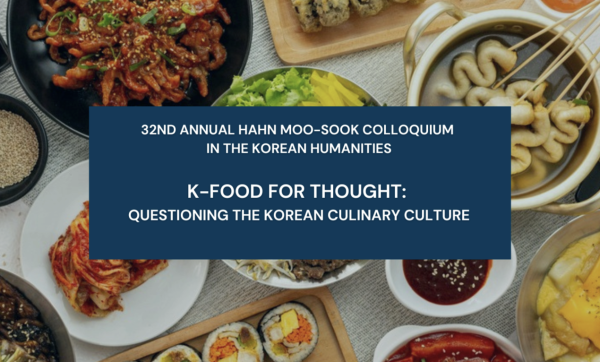The 32nd Annual Hahn Moo-Sook Colloquium in the Korean Humanities


The Department of East Asian Languages and Literatures (EALL) & The Institute for Korean Studies (GWIKS) at George Washington University Proudly Present:
The 32nd Annual
Hahn Moo-Sook Colloquium
In the Korean Humanities
K-Food for Thought: Questioning the
Korean Culinary Culture
Friday, October 25, 2024 09:30 AM - 4:00 PM EDT |
Hybrid Event In Person, 1957 E. St. NW, Harry Harding Auditorium (Room 213), Washington, DC, 20052 Virtual via Zoom Note*: Lunch will be provided for in-person attendees |

Event Description Korea has made a concerted effort to promote Korean cuisine to the international community. Starting with the serving of kimchi in the 1988 Seoul Olympics, Kim Young Sam’s globalization efforts, First Lady Kim Yoon-ok’s international kimchi-making demonstrations, kimjang (tradition of making kimchi) being inscribed as the UNESCO Intangible Cultural Heritage of Humanity in 2013, Michelle Obama sharing her recipe for kimchi, and of course the myriad representations of K-Food in Korean dramas, music, mukbang, films, documentaries, and reality tv shows. Once seen as an exotic and pungent ethnic food has now become a recognizable and desirable international cuisine. However, what exactly does the “K” in K-Food mean? Does it still pertain to national borders (i.e. South Korea only)? How expansive is K-Food, as it changes from geographic region, culture, availability of ingredients, etc.? What is the global impact of K-Food, as it crosses cultural cuisines such as Korean Chinese foods, Korean pizzas, Korean burgers, hotdogs? Or the global branding such as Paris Baguette, Bibigo, CJ, etc.? How far back does K-Food go historically, even as far back as the Choson dynasty? The 32nd HMS Colloquium will attempt to understand the complexity, cultural dynamics, and the history of the “K” in K-Food.
|
Background The Hahn Moo-Sook Colloquium in the Korean Humanities series at the George Washington University provides a forum for academic discussion of Korean arts, history, language, literature, thought and religious systems in the context of East Asia and the world. The colloquium series is made possible by an endowment established by the estate of Hahn Moo-Sook (1918-1993), one of Korea’s most honored writers, to uphold her spirit of openness, curiosity, and commitment to education. |
This event is on the record and open to the public.

